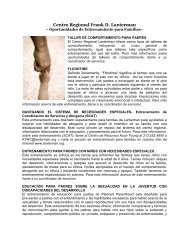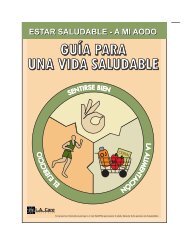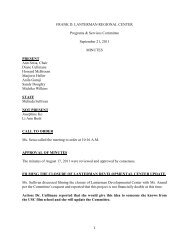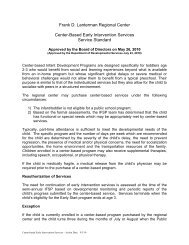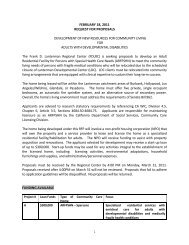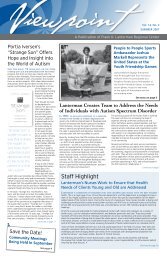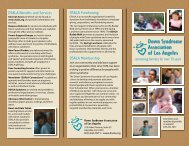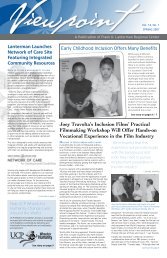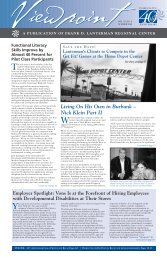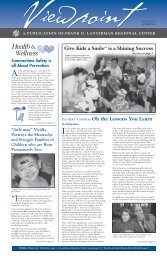Guide to Lanterman for Early Start Families - Frank D. Lanterman ...
Guide to Lanterman for Early Start Families - Frank D. Lanterman ...
Guide to Lanterman for Early Start Families - Frank D. Lanterman ...
You also want an ePaper? Increase the reach of your titles
YUMPU automatically turns print PDFs into web optimized ePapers that Google loves.
Family Centered Planning<br />
At its core, developing and implementing a family centered plan<br />
is about providing services and supports that are individualized<br />
and flexible over time, are built on strengths and needs of<br />
the child and the family, reflect priorities and concerns of the<br />
family, and respect the family’s preferences and choices. Family<br />
centered planning is an approach <strong>to</strong> determining, planning <strong>for</strong><br />
and working <strong>to</strong>ward the preferred future of a child. It provides a<br />
framework <strong>for</strong> making decisions and takes in<strong>to</strong> account a variety<br />
of fac<strong>to</strong>rs that affect a child’s life.<br />
The Individualized Family Service<br />
Plan (IFSP)<br />
Family centered planning is used <strong>to</strong> develop an Individualized<br />
Family Service Plan (IFSP) <strong>for</strong> every child birth <strong>to</strong> 3 years of age<br />
who receives <strong>Early</strong> <strong>Start</strong> services from <strong>Lanterman</strong>. A child’s initial<br />
IFSP is completed within 45 calendar days of the time the family<br />
first contacts the Regional Center. The plan is developed by a<br />
planning team including the family and the service coordina<strong>to</strong>r,<br />
and may include other people who provide the child or family<br />
with support and services.<br />
The IFSP identifies and documents the family’s desired outcomes<br />
and states clearly how the team will work <strong>to</strong>ward achieving these<br />
outcomes and how any health or safety issues will be addressed.<br />
It includes a statement of the infant’s or <strong>to</strong>ddler’s present levels<br />
of physical development, including vision, hearing and health<br />
status; and cognitive, communication, social, emotional and<br />
adaptive development. The IFSP also includes:<br />
v A statement of the family’s concerns, priorities and resources<br />
related <strong>to</strong> meeting the special developmental needs of<br />
their child.<br />
v A statement of the major outcomes <strong>to</strong> be achieved <strong>for</strong><br />
the child.<br />
v A schedule of all services and supports, including the<br />
type and amount of services and supports, who will<br />
provide them, whether they will be provided in natural<br />
environments, and an explanation if a service is not provided<br />
in a natural environment.<br />
v Criteria, procedures and timelines <strong>for</strong> determining the degree<br />
<strong>to</strong> which progress is being made and whether changes <strong>to</strong> the<br />
plan are necessary.<br />
v Steps <strong>to</strong> be taken <strong>to</strong> ensure the child’s smooth transition out<br />
of <strong>Early</strong> <strong>Start</strong> at age 3.<br />
Preparing <strong>for</strong> the IFSP Meeting<br />
Effective planning requires your service coordina<strong>to</strong>r <strong>to</strong> take the<br />
time <strong>to</strong> learn what is important <strong>to</strong> your family and <strong>to</strong> ensure<br />
that any issues of health and safety are carefully considered. In<br />
preparation <strong>for</strong> the IFSP meeting, your service coordina<strong>to</strong>r will<br />
spend time getting <strong>to</strong> know your family’s unique situation by<br />
reviewing your child’s record, assessments and recommendations<br />
from service providers, and progress reports. He or she will<br />
also begin development of the health status review and IFSP<br />
documentation that will be completed at the meeting.<br />
You, <strong>to</strong>o, should prepare <strong>for</strong> this meeting by thinking about your<br />
child’s strengths and needs, your concerns and the hopes and dreams<br />
you have <strong>for</strong> him or her. Identify the knowledge and strengths that<br />
you possess that may help your child take steps <strong>to</strong>ward achieving<br />
desired outcomes. Also think about what types of training or<br />
additional knowledge you may need <strong>to</strong> help support your child, as<br />
well as what professional services or supports your child may need <strong>to</strong><br />
achieve desired outcomes. Additionally, you should bring with you<br />
in<strong>for</strong>mation about personal, financial and other resources, such as<br />
private insurance, that are available <strong>to</strong> you and your child.<br />
FAQ<br />
Why is it important <strong>for</strong> my service coordina<strong>to</strong>r <strong>to</strong> visit<br />
me in my home?<br />
Many of the issues discussed at a meeting between a<br />
family and service coordina<strong>to</strong>r are personal and private,<br />
and it is difficult <strong>to</strong> maintain a desired level of privacy and<br />
confidentiality when these matters are discussed in a public<br />
setting, such as a coffee shop or restaurant. In addition, it<br />
is essential <strong>for</strong> service coordina<strong>to</strong>rs <strong>to</strong> be familiar with a<br />
child’s home situation so they can make the appropriate<br />
recommendations, especially in regards <strong>to</strong> in-home supports.<br />
The better your service coordina<strong>to</strong>r knows your family, the<br />
better he or she will be able <strong>to</strong> support you.<br />
<strong>Guide</strong> <strong>to</strong> <strong>Lanterman</strong> Regional Center <strong>for</strong> <strong>Early</strong> <strong>Start</strong> <strong>Families</strong><br />
13



